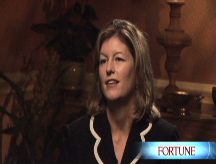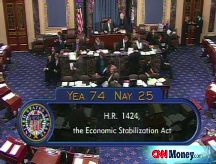Insurers dive on Reid's 'bankrupt' quote
Comments from Senate Majority Leader Harry Reid about a 'major insurance company' on the verge of bankruptcy send already hard-hit stocks sharply lower.
NEW YORK (CNNMoney.com) -- Several big life insurance stocks fell sharply Thursday, dragged down by jitters about their role in the credit crisis and fears sparked by a comment from Senate Majority Leader Harry Reid, D-Nev., Wednesday about a potential bankruptcy in the industry.
"We don't have a lot of leeway on time. One of the individuals in the caucus today talked about a major insurance company. A major insurance company -- one with a name that everyone knows that's on the verge of going bankrupt. That's what this is all about," Reid said prior to the Senate's approval of the $700 billion bailout bill.
Steven Schwartz, an analyst who covers insurance companies for Raymond James & Associates, said that even before Reid made his bankruptcy comment, investors were growing worried about life insurers' exposure to real estate as well as "secondary exposure" via investments in troubled finance firms like Lehman Bros, Wachovia and Washington Mutual.
But the comment from Reid clearly caused even more fear.
"Harry Reid didn't help any," Schwartz said.
New York-based MetLife (MET, Fortune 500) was one of the hardest-hit insurers Thursday. Its stock plunged nearly 16%. Thursday's drop comes after a 14% decline on Wednesday.
In light of this, MetLife issued a statement Thursday afternoon to address Reid's comments.
"The statement yesterday by Senate Majority Leader Harry Reid does not apply to MetLife. MetLife is financially sound and has high ratings from all of the major insurance ratings agencies. MetLife is fully able to meet all its obligations," the company said.
Shares of Hartford Financial Services (HIG, Fortune 500) fell about 33%, following a 7% decline on Wednesday. The stock has lost more than half of its value this week.
Jeffrey Schuman, analyst for Keefe, Bruyette & Woods, wrote in a report that the sell-off stems from worries about the company's third quarter results, which will be released later this month.
Schuman estimated that Hartford has "likely" experienced credit losses of up to $800 million from preferred stocks and debt tied to Lehman, AIG and Washington Mutual.
These concerns prompted Fitch Ratings to impose a "negative outlook" on the company Monday, raising more concerns about the company's need for capital.
Schuman wrote in a note that the recent drop was "likely overdone" but added that Hartford will face "difficult operating headwinds and ongoing credit losses" in the near-term.
A call to Hartford for comment Thursday was not immediately returned. But on Wednesday, the company said that its "core operating businesses are performing well and our liquidity remains strong."
A spokesman for Sen. Reid backtracked a bit Thursday and said that the senator was not aware of any company being in danger of bankruptcy.
"Senator Reid is not personally aware of any particular company being on the verge of bankruptcy. He has no special knowledge about [a bankruptcy] nor has he talked to any insurance company officials," said Jim Manley, spokesman for Sen. Reid, in an email to CNNMoney.com.
"Rather, his comments were meant to refer to the conditions in the financial sector generally. He regrets any confusion his comments may have caused," Manley added.
Still, shares of other top life insurers also fell sharply Thursday. Paris-based AXA (AXA) dropped 12.5%%.
Other insurers -- including Canadian based Manulife Financial Corp. (MFC), which owns John Hancock, Prudential Financial (PRU, Fortune 500) and Principal Financial Group (PFG, Fortune 500) -- also slipped, falling 6%, 11% and 15.5% respectively.
Schwartz of Raymond James said some of the concerns about insurers are overblown. He said that, generally speaking, insurers haven't invested in the types of "truly toxic assets" that have led to huge losses for some investment banks and commercial banks.
He described the failure of AIG, which lost billions of dollars on credit default swaps tied to subprime loans and was essentially taken over by the government in exchange for an $85 billion bridge loan, as "very atypical" for the insurance industry.
"The industry will get through this," said Schwartz. "[But] that's not to say there won't be strains." ![]()




